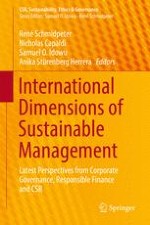This book provides a rich collection of essays discussing and showcasing the transformation of businesses around the world towards sustainability and responsibility. Based on a framework of global theoretical approaches, it presents practical examples and cases from a variety of industries, regions and corporate functions. It also highlights the latest insights on how corporations consider sustainability in the governance of their respective organization. Furthermore, the book features a section dedicated to responsible finance, and outlines business and management-driven approaches that contradict the traditionally held belief that a trade-off exists between sustainability, social responsibility and profit.
